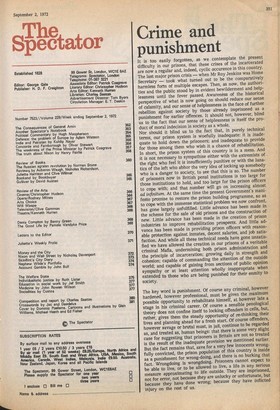Crime and punishment
It is too easily forgotten, a's we contemplate the present difficulty in our prisons, that these crises of the incarcerated are now a regular and, indeed, cyclic occurence in this country. The last major prison crisis — when Mr Roy Jenkins was Home Secretary — took what turned out to be the comparatively harmless form of multiple escapes. Then, as now, the authorities and the public stood by in evident bewilderment and helplessness until the fever passed. Awareness of the historical perspective of what is now going on should reduce our sense of calamity, and our sense of helplessness in the face of further rebellion against society by those already imprisoned as a punishment for earlier offences. It should not, however, blind us to the fact that our sense of helplessness is itself the product of moral indecision in society as a whole.
Nor should it blind us to the fact that, in purely technical terms, our prison system is woefully inadequate: it is inadequate to hold down the prisoners; and inadequate to provide for those among them who wish it a chance of rehabilitation. In short, the prison system of this country is in a mess. And it is not necessary to sympathise either with the extremists of the right who feel it is insufficiently punitive or with the lunatics of the left who abhor the very idea of locking up somebody who is a danger to society, to see that this is so. The number of prisoners now in British penal institutions is too large for those institutions to hold, and too large for the prison officers to cope with; and that number will go on increasing almost ad infinitum. At the same time the present Government's manifesto promise to restore the prison building programme, so as to cope with the immense statistical problem we now confront, has gone largely unfulfilled. Little advance has been made in the scheme for the sale of old prisons and the construction of new. Little advance has been made in the creation of prison industries to improve rehabilitation prospects. And little advance has been made in providing prison officers with reasonable protection against inmates, decent salaries, and job satisfaction. And while all these technical needs have gone unsatisfied we have alloWed the creation in our prisons of a veritable criminal Mafia, undermining both prison administration and the principle of incarceration; growing daily in strength and cohesion; capable of commanding the attention of the outside world; and capable of gaining from sections of public opinion sympathy or at least attention wholly inappropriate when extended to those who are being punished for their enmity to sOciety.
The key word is punishment. Of course any criminal, however hardened, however professional, must be given the maximum possible Opportunity to rehabilitate himself, at however late a 'stage in his criminal career. Of course a sensible penological 'theory does not confine itself to locking offenders in cells, but, rather, gives them the steady opportunity of re-,thinking their Eves and planning ahead for a fresh start. Of course offenders, however savage or brutal must, in jail, continue to be regarded as, and treated as, human beings: that there is some very slight case for suggesting that prisoners in Britain are not so treated is the result of the inadequate provision we mentioned earlier. But the fact remains that, save for a very few innocents wrongfully convicted, the prison population of this country is inside as a punishment for wrong-doing, and there is no burking that fact. Wrongdoing is wrongdoing. Prisoners cannot expect to be able to live, or to be allowed to live, a life in any serious measure approximating to life outside. They are imprisoned, not for error, not because they are unlucky or unfortunate, but because they have done wrong; because they have inflicted injury on the rest of us.






































 Previous page
Previous page